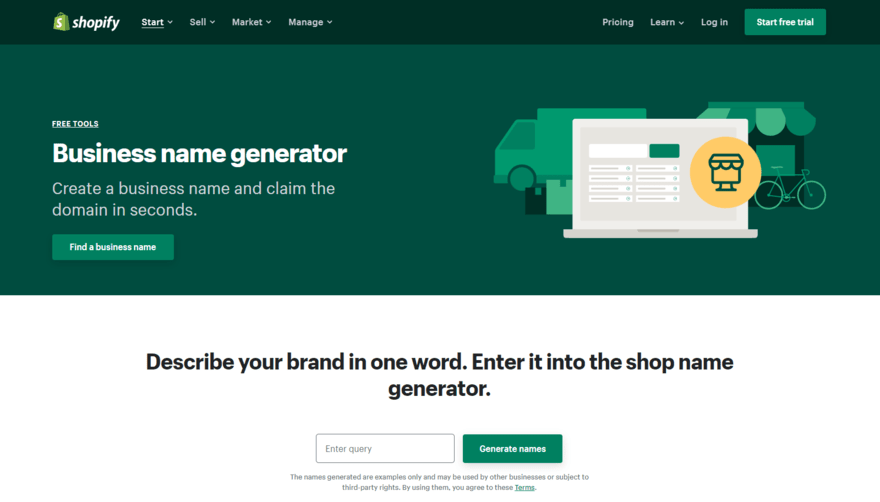How to Come Up With a Business Name: Checklist
If you click to purchase a product or service based on our independent recommendations and impartial reviews, we may receive a commission. Learn more
Starting a business can be a strange process – because it doesn’t always happen in the order that you’d think.
You could, for example, have written your business plan, secured investment, settled on your business model, and bought the stock you’ll be selling – all without doing one fundamental thing first.
Choosing a name!
Your business name is a vital component of your brand’s image and identity. It’s how people will find you, how they’ll understand what you do, and how they’ll remember you. But the question remains – how to come up with a business name?
Below, we’re answering just that. We’ll walk you through why a business name matters, how to find one, and what to avoid as you validate your business name’s legality – and practicality. Let’s go!
Why a Business Name Matters
A business name matters because, in almost all cases, it’s one of the very first things your customer notices.
As such, a good business name needs to tell them, in so many words, what you do – or at least offer a flavor as to what you’re about. It should also reassure your potential customer that they’re in the right place.
It needs to invite and inform. To engage, excite, and even – depending on what your business is about – entertain, too.
And, just as the right business name can win clients, boost your brand’s credibility, and sell more, the wrong business name can do the opposite. A bad name confuses the customer, makes for a forgettable brand, and – ultimately – discourages them from interacting with your business.
In other words, your business name isn’t merely important to your brand.
It is your brand!
Finding a Business Name
So – now you know why unearthing the right business name is important. But how do you go about actually finding one?
Below, we discuss what to avoid, where to go for inspiration, and how to put your new business name into practice.
What to Avoid
Before we look at what business name to adopt, we first have to know what business names to avoid. We’ve listed a few below.
1. Names that are hard to spell or pronounce
As a business, you want to get to the stage where your reputation precedes you. Where people are seeking out your brand by name – not simply finding you in Google’s search results.
Your job? To make it as easy for them to do so as possible. Which, in turn, means your business name needs to be a cinch to spell and pronounce. Business names that are sleek, simple, and spellable are memorable – and when a name is memorable, the brand is, too.
2. Names that are too similar to your competitors
Your business name is your chance to stand out. So it stands to reason that if your chosen moniker is simply too similar to one or more of your rivals’, yours will be quickly forgotten. Or worse – mistaken for the name of one of your competitors!
To avoid this, ensure you engage in thorough online research before picking a name – keying search terms relevant to your industry, products or services into Google should do the trick.
3. Names that aren’t relevant to your brand or industry
This one is fairly straightforward. “The Broccoli Barn” is, of course, an excellent name for a vegetable vendor. It’s not such a good name for a provider of enterprise-grade HR software.
So be sure to pick a name that’s reflective of your brand and industry – that includes one or more of your niche’s top keywords or most recognizable aspects. It’ll help reassure your potential customers that they’re in the right place and boost your authority as a provider of the product or service they’re looking for.
Find Out More
We interviewed the founder of Ovo Electric Bikes, Ben Schein, who told us about the ingenious meaning behind his business name. Can you guess why “Ovo” is so relevant to a bike company? (Hint, it helps to picture a bike while you look at it)! You can read our full interview with Ovo Electric Bikes for the full story.
Finding Inspiration
Choosing a business name can be tricky. You are, essentially, attempting to pluck a witty, memorable, and relevant word out of thin air – how does it happen?
Well, you’ll need some good old-fashioned inspiration first. For this, you can research:
- Other brands: While you don’t want to copy other brands (see our previous point!), you can glean some ideas from what they’re doing well – or, in some cases, what they’re not doing well. Do your competitors have one-word names? Compound names? Are there certain letters, or patterns, that emerge? If so, you might choose to follow in the same vein – or cut your own unique path.
- Online business name generators: For a less thought-intensive route, head to one of these free online tools, such as Shopify’s name generator. Simply enter a word or two – or whichever phrase is most relevant to what your business does – into a search bar. The tool will then churn out a bunch of high-quality (and, at times, quirky) names for you to adopt. At no cost!

What else should you consider when settling on a business name?
Whether you choose to sit down with a pen and paper and do it the old-fashioned way, or simply let a piece of software do it, there are a whole bunch of things you need to take into account when picking the name of your business. These include:- Finding a name with meaning: While online business name generators are quick and convenient, they can’t conjure up a name that means something to you – as an individual, and as a company. So think back to the reasons you started your business, and what drives you to make it a success now – that should get the sparks of inspiration flying!
- Making it catchy: Long, ungainly business names that are hard to read and understand aren’t memorable. So avoid special characters (#, @, $, *, etc.), and strange, alternative spellings of common words. Keep it simple – and the catchiness will soon follow!
Practicality
So, you’ve done the hard yards, and produced a business name that’s simple, meaningful, catchy, inspired, relevant, and (breathe) totally different from any name sported by a competitor. Nice work!
But of course, you’re not done just yet. Before you can unveil your new business name to the world, you’ll need to ensure it’s practical first. Here’s how:
1. Checking the domain name availability
Your business name won’t just go on your website’s masthead. It’s not solely for the front window of your bricks-and-mortar store, or to be plastered across your digital marketing efforts.
It’ll be your domain name, too – your website’s unique identifier, that people will type into their search bars to find your online presence directly. (Think “google.com”, or “instagram.com” as examples.)
You’ll want your domain name to match your business name – which means you’ll need to check its availability online before you can go any further.
Fortunately, this is super easy to do. Simply head to a domain name registrar – an online domain name merchant – where you can check your chosen domain name’s availability. You can browse multiple domain name variations, compare prices, and – when you’re ready – select and purchase one to connect to your website.

2. Checking your business name’s legality
Soon, you’ll need to think about trademarking your new business name – otherwise, similar companies will be able to create knock-off brands, piggybacking unfairly on your brand power to make a quick buck.
But before you can trademark your name, you’ll need to run a trademark search. This will tell you whether your business name, or something similar, has already been trademarked – and will give you an idea as to whether a trademark application will be successful.
Then, it’ll be time for a Secretary of State search. Ahead of registering your company under your chosen business name – be that as an LLC, corporation, or under whichever structure suits you best – you’ll need to ensure that your business name isn’t too close to a company that’s already registered within the Secretary of State’s files. (If it is, you may not be able to register it.)
You can do this all online.
3. Checking whether your business name has any unsavory connotations
Finally, it’s time for one last check – ensuring that your chosen business name is free of relation to anything that might damage your burgeoning business reputation.
Usually, a quick Google search should take care of this. You’re essentially looking for anything topical – recent news stories, for instance – that is related to, or could be perceived as being related to, your brand name. It’s unlikely – but always worth making sure of before you reveal the name of your business to the world!
More Information
- How to Create SEO-Friendly URLs: Learn how to optimize your URLs for search engines
How to Come Up With a Name For a Business: Summary
When thinking about how vital choosing the right business name is, it’s useful to analogize it to your own name. How many times do you write it, hear it, say it, read it – in any one given day? Our bet is plenty!
So, however you choose the name of your business, don’t rush it. Take your time, and pick something catchy, relevant, and unique. But most of all, make it meaningful. You’ll be seeing with, working with (and, if you don’t end up liking it, living with) this name for as long as you’re in business.
So follow our tips above, and make sure it’s a good one!

Leave a comment